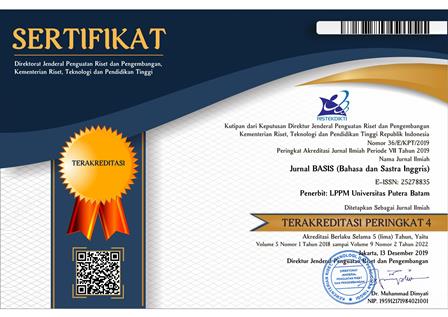EFL STUDENTS’ PREFERENCES OF A GOOD ENGLISH TEACHERS
DOI:
https://doi.org/10.33884/basisupb.v10i2.8054Keywords:
preference, characteristics, effective teacher, a good EFL teacher, A Good EFL Teacher, Characteristics, Effective Teacher, Preference.Abstract
The process of teaching is a continuous learning journey, even with years of experience in teaching English as a foreign language, it is difficult to determine how to be an effective teacher. Different learners and teachers have also different views on what constitutes a "good English language teacher”. The aims of this study are to investigate and identify the qualities and characteristics that make an English teacher competent, as perceived by learners, particularly in the post COVID-19 and to gain insights into how learners' preferences may have evolved or changed due to the challenges and experiences faced during the pandemic, and how these factors influence their evaluation of effective English teachers. The participants in this study are students enrolled in the English Department of FKIP Lambung Mangkurat University Banjarmasin, spanning one batch which is 2020 with total 49 respondent students as participants. Data was collected at the sixth semester using a quantitative descriptive method this was employed to assess the students' feedback using a survey tool adapted from research conducted by Wichadee (2010) and Zamani and Angahari (2016). The questionnaire using close-ended question based on a four-point Likert scale. Total there are 60 statements and it divides from 4 categories (Socio-affective, Pedagogical Knowledge, Proficiency Skills Organization and Communication Skills) and there are 15 statements for each category. Based on the result, the most considered as prominent from the other category is Organization and Communication Skills, as many 82% respondents agreed that teacher should have good competencies especially in good communication skills. The anticipated findings of this study can assist teachers in self-reflection, evaluation, and the enhancement of their teaching practices. Additionally, it can contribute to their personal growth.
References
Alzeebaree, Y., & Hasan, I. A. (2020). What makes an effective EFL teacher: High School Students’ Perceptions. Asian ESP Journal, 16(1–2), 169–183.
Anugerahwati, M., & Saukah, A. (2010). Professional Competence of English Teachers in Indonesia : a Profile of Exemplary Teachers. Indonesian Journal of English Language Teaching, 6(2), 107–119.
Aydin, S. (2009). Test Anxiety among Foreign Language Learners: A Review of Literature. Journal of Language and Linguistic Studies, 5(1), 127–137. http://www.jlls.org/index.php/jlls/article/view/77/77
Ayu, A., Angganita, P., Qalbi, N., & Burhanuddin, W. (2020). Students’ Perception Towards the Characteristics of a Good English Teacher. Jurnal Keguruan Dan Ilmu Pendidikan (JKIP) FKIP Unismuh Makassar, 7(1), 55–63.
Barnes, B. D., & Lock, G. (2013). Student perceptions of effective foreign language teachers: A quantitative investigation from a Korean university. Australian Journal of Teacher Education, 38(2).
Dincer, Goksu, & Takkac. (2013). Common Characteristics of an Effective English Language Teacher. Educational Research Association The International Journal of Educational Researchers, 3, 1–8.
Febriyanti, E. R. (2018). Investigating English department students’ perceptions about a good English language teacher. International Journal of Language Education, 2(2), 83–95. https://doi.org/10.26858/ijole.v2i2.6378
H.Douglas Brown. (2000). [H._Douglas_Brown]_Teaching_by_Principles,_Second_(BookFi.org).pdf. In Teaching by Principles An Interactive Approach to Language Pedagogy (p. 491).
Headden, S., & McKay, S. (2015). Motivation Matters: How New Research Can Help Teachers Boost Student Engagement. The Malaysian Online Journal of Educational Science, Content Knowledge (PCK). The Malaysian Online Journal of Educational Science, 3(3), 40–55. www.moj-es.net
Mazulfah, M., Faridi, A., Rukmini, D., & Mujiyanto, J. (2022). Challenges of English Language Teaching in Post-Pandemic Era at Iain Salatiga. https://doi.org/10.4108/eai.14-8-2021.2317616
O’Dwyer, S. (2006). The English Teacher as Facilitator and Authority. Tesl-Ej, 9(4), 1–15.
Restu, D. W., Atmowardoyo, H., & Akil, M. (2018). The Profile of Effective EFL Teachers: A Descriptive Study at Senior High Schools in Gowa. ELT Worldwide: Journal of English Language Teaching, 5(1), 11. https://doi.org/10.26858/eltww.v5i1.5799
Sulasmi, S., & Prasetyarini, A. (2017). Good English Teacher Characteristics As Perceived By The Seventh Semester Students Of English Education Departement, Universitas Muhammadiyah Surakarta (Doctoral dissertation, Universitas Muhammadiyah Surakarta).
Shishavan, K. S. & H. B. (2009). Characteristics of an Effective Teacher as Percived by Iranian Teachers and Learners of English. Journal of Education and Learning, 2(4), 130–143.
Zamani, R., & Ahangari, S. (2016). Characteristics of an effective English language teacher (EELT) as perceived by learners of English. International Journal of Foreign Language Teaching & Research, 4(14), 69–87. http://jfl.iaun.ac.ir/article_17138_72021c12d9759a235038699132c8f008.pdf

















